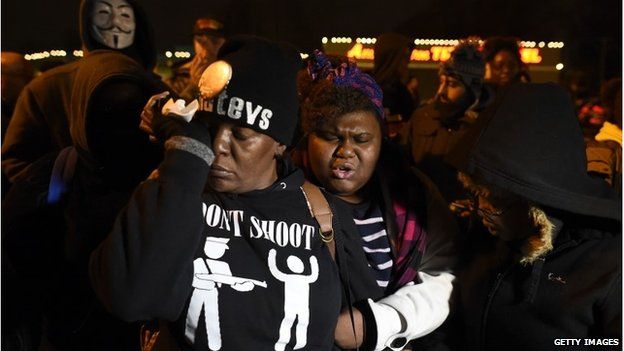Michael Brown shooting: Ferguson jury reaches verdict
- Published

A grand jury has made a decision on whether to charge a Missouri police officer over the death of an unarmed black teenager.
His family confirmed that the jury's decision is expected to be announced later on Monday.
Michael Brown, 18, was killed by Darren Wilson on 9 August in the St Louis suburb of Ferguson, Missouri.
His death sparked protests, sometimes violent, as police were criticised for using military grade riot gear.
Missouri Governor Jay Nixon has declared a state of emergency in the area and called in 400 National Guard troops in anticipation of protests, should charges not be filed in the case. He also called for restraint ahead of the announcement.
A White House spokesman said that President Barack Obama had urged those who wished to protest against the jury's decision to "do so peacefully".
The case has stoked racial tensions in the US, with many in the African American community calling for Mr Wilson to be charged with murder.
Some witnesses say Mr Brown had his hands up in apparent surrender to the officer when he was shot. Other witnesses saw things differently.
Police have said there was a struggle between the teenager and the officer before the shooting.
'Respect and restraint'
Protests have continued in the area over the past few days in anticipation of a grand jury decision, including in Clayton, where the grand jury is meeting.
Police have put up barricades around the court house, while many shops in Ferguson have boarded up their windows ahead of the announcement.
Protesters began to gather outside the Ferguson police department chanting: "Hands up, don't shoot."
Speaking late on Monday afternoon, Governor Nixon said he hoped all sides would show "tolerance, mutual respect, and restraint", adding that authorities were focused on trying to "protect lives, protect property and protect free speech".
He said several churches would serve as safe havens, providing food and shelter, and that mental health providers were on hand to help "ease the mental strain that these events have caused".
Mr Brown's family has also appealed for calm ahead of a grand jury decision.
Michael Brown Sr said in a video posted online that "hurting others or destroying property is not the answer" .
On Monday, the family called for four-and-half-minutes of silence following the jury's decision, apparently a reference to the more than four hours that Michael Brown's body lay in the street.
Protester Bryon Conley, 51, told Reuters news agency: "I hope we can do this in a peaceful way.
"I just don't want no-one to look at our little town thinking we're a bunch of wild animals. We're really good people here."
Ferguson decision: A timeline of events
Correspondents say that leaks from the grand jury testimony, including the official autopsy report, indicate there may be no indictment.
The grand jury is responsible for deciding whether Mr Wilson should be charged with any one of four possible crimes: first-degree murder, second-degree murder, voluntary manslaughter or involuntary manslaughter.
Nine out of the 12 members of this jury must vote yes to indict.
The jury consists of 12 randomly picked citizens - six white men, three white women, one black man and two black women.
If the grand jury decides not to indict, the state prosecutor, Robert McCulloch, could still bring a case against Mr Wilson.
However, Mr McCulloch has already said he would not do this, but would seek permission to release as much information as possible so the public could understand the decision.